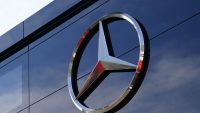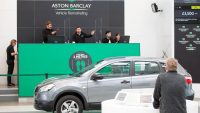Marshall Motor Group clocked up pre-tax profit of £95.2m in the 15 months to the end of March this year.
The previously-listed car dealer group – now part of Constellation Automotive, the owner of Cinch and We Buy Any Car – changed its accounting period to match that of its new parent firm.
It means like-for-like comparisons for Marshall, previously led by Used Car Award winner Daksh Gupta, are hard to make.
However, the accounts do show the group was performing incredibly well prior to it being snapped up for £325m by Constellation.
At the end of the accounting period, Marshall owned £215m worth of property and £27m of cash in its bank account.
Gross profit for the year was £457m.
When you take into account the group’s profit before tax for the year, and goodwill for its franchises, it shows how much of a bargain Constellation got.
The secretive automotive group snatched Marshall off the stock market this year after buying the majority shareholding from the Marshall family.
The deal surprised even the board of directors who didn’t know it was happening until it was officially announced.
Mike Allen, analyst at broker Zeus Capital, said Constellation paid ‘a very good price’ for a ‘well run business with excellent brands and locations’.
David Kendrick, partner at accountancy firm UHY Hacker Young, said: ‘The Constellation purchase looks extremely good value based on these results.
‘Listed motor businesses don’t seem to have the value attributed to them they deserve – a three times multiple based on these results is crazy, especially with the amount of freehold property also within the group. Typically it’s 6-8x valuations, not three!
‘Regardless of the economy and market conditions, this looks to be an exceptional deal.’
Mike Jones, compiler of the Car Dealer Top 100 list of most profitable car dealers, added: ‘Whether they got a bargain or not depends on how you look at it. The EBITDA figure is around £140m so the £325m is less than three times that.
‘But Constellation bought Marshall at a peak price and many of the dealer groups have dropped back this year. It’s a bargain price only if the group can maintain those levels of profitability.’
The accounts, just filed at Companies House, show revenue for the 15-month period stood at £3.8bn – a growth of a staggering £1.6bn compared to 2020.
‘While this reflects the comparison of a 15-month period with a 12-month period, there was also contribution from the acquisitions in the period, most noticeably the Motorline group of companies,’ said the company.
Marshall snapped up the 48-deal group Motorline for £64.5m in October 2021.
The Marshall accounts reveal profit before tax of £95.2m for the period compared to £20.9m in 2020.
Gross margins stood at 12.2 per cent as Marshall benefited from ‘significant market tailwinds’.
‘In particular, the unprecedented used vehicle value appreciation and favourable demand-to-supply conditions for both new and used vehicles,’ said the company.
Marshall sold 68,276 new cars during the 15-month period with sales to retail customers up nearly 50 per cent and fleet customers up 76.5 per cent.
New car profit margins were up to eight per cent.
Marshall sold 77,308 used cars – up from 44,505 in 2020 – with revenue from used cars accounting for £1.8bn.
Used car margins stood at 7.8 per cent compared to 6.6 per cent the year before as the group benefited from rising used car prices.
Aftersales brought in £386.4m up 60 per cent.
The accounts show Marshall closed 11 dealerships in the 15 months.
In the first three months of 2022, the accounts show that despite the new car market falling Marshall continued to increase sales with a 22.1 per cent rise in retail sales.
Non underlying costs included £7.7m for restructuring with £5m of those attributed to the group’s change of ownership
The accounts show that at the end of March, Marshall represented 26 brands and had 160 franchises in 37 counties across the country.



































